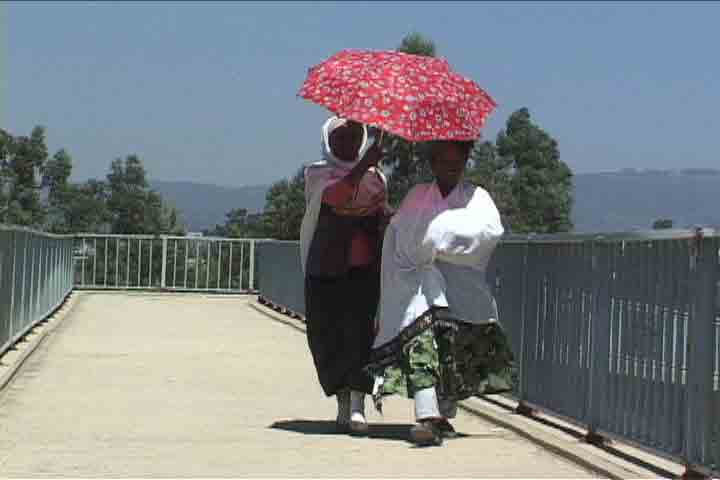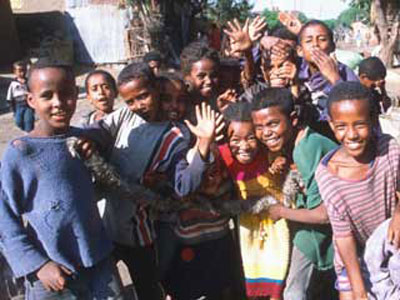From RISK to ACTION
Women and HIV/AIDS in Ethiopia
To download this film, click here or vimeo in the lower right-hand corner above.
At vimeo From RISK to ACTION webpage
click Download button beneath the film description.
Select HD .MP4 file or SD .MP4 file to download.
Full-length film (39 mins. 19 secs.) Vimeo Link
Full script for From RISK to ACTION pdf or Word doc
Click here to download From RISK to ACTION
Synopsis
From RISK to ACTION documents efforts in Ethiopia by those who recognize that gender bias, poverty, lack of access to education, and violence make women more vulnerable to HIV infection than men. This film profiles the connection between gender and HIV/AIDS, as well as the work of leaders in education and policy change to improve the status of women.
We meet not only trained professionals, but a range of citizens who play essential roles in being of service to the community. We see a group of teen-aged girls perform a play which they've written for their peers to raise awareness about safer sex. We watch commercial sex workers teach each other about condom use. We hear from a women's rights attorney who describes in depth why women are particularly vulnerable. We also meet men, a male nurse who teaches sex workers new skills as alternatives to prostitution, and an anti-aids club coordinator who organizes street theater performances to give illiterate people, information about prevention. The courageous work of community leaders to improve the status of women and secure their human rights is explored in depth from many perspectives.
Transcription
Full script for From RISK to ACTION
pdf or Word doc
Reviews for the Series
"Concentric Media's efforts are helping many others to find their voices and is allowing them to participate in the healing process. In the end it is their voices that will teach the community and thereby start reversing the high trend for the incidence of HIV/AIDS in nations like Ethiopia. HIV+ people have taken more than a first step in creating awareness about the disease. It is our turn to listen and get involved."
AMY L. HILL
Center for Digital Storytelling
"Whether in Ethiopia or in the US, accurate information and honest communication about sexuality are essential. This includes information to dispel the myths about HIV/AIDS that lead to fear of and discrimination against those living with or orphaned by the virus, and to a reluctance to get tested for the virus. It also includes a willingness to overcome deeply rooted cultural discomfort with discussions about sexual behavior."
Submitted by NOMBUSO
The Communication Initiative Network
Credits
Director: Dorothy Fadiman
Producers: Amy Hill, Dorothy Fadiman, Matthew Luotto, Shenaz Zack
Camera: Matthew Luotto, Henock Hailu, Cotton Coulson
Editors: Amy Hill, Matthew Luotto,
Shenaz Zack
Still Images: Sisse Brimberg
Music: Aster Awake
Outreach: Maribea Berry, Johanna Gereke
Principal advisor: Dr. Agonafer Tekalegne
Support team in the USA and Ethiopia
Information on women with HIV/AIDS
in Ethiopia/Sub-Saharan Africa (pdf)
Sub-Saharan Africa accounts nearly for 70% of HIV and AIDS cases world wide. At present, women are 58% of adult HIV infections in Sub-Saharan Africa. The rate of infection for young women however is likely to be twice as high as that for young men. The inequalities and disadvantage that characterizes the lives of women
in Africa drive this exponential rate of increase in the infection of women and girls. The poverty of women often leads to risky behavior. Young girls are vulnerable victims of sexual predators in their homes, in the schools and in the community. Violence and war leave women with no protection from rape. Furthermore women do not have the power or means to negotiate for safer sex or protection from coercion. This situation is fuelling the pandemic with great cost to human lives, to the care for children and to national economies. Despite the effect of their vulnerability to HIV/AIDS, women have been on the forefront of efforts to cope with the pandemic. Women represent 95% of the care providers of those infected and affected by the disease.
WOMEN AND HIV/AIDS
as published in:
AFRICAN UNION
Events
World AIDS Day Show
This World AIDS Day Special features a discussion about the impact of HIV/AIDS on the lives of children in Sub-Saharan Africa. Studio guests Amber Stime, Founder and Executive Director of African Cradle and Peter Laugharn, Executive Director of the Firelight Foundation each explore different ways their groups help children adjust when their lives have been affected by AIDS. Amber and Peter's work includes not only children, but also their families and in some cases, adoptive parents. Short video clips complement an engaging conversation about personal experiences, breaking down stigma and the hope for future generations.
Reproductive Health, Family Planning and HIV/AIDS in Africa – UN Conference








